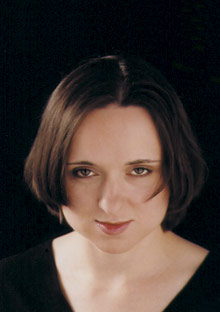
Photo: Bennett Miller
The author, public radio contributor, and self-described indoorsy person falls for outdoorsy epics, ace historians, and one very unhinged memoirist.
As someone who makes a living writing books, my favorite thing to talk about is other people's books. And I especially love reading books that have nothing to do with me. Which is why, as a shut-in author who knows nothing of hand-to-hand combat, I am obsessed with Lee Child's thrillers about an ex-military policeman drifter. Or, what with being afraid of water and prone to seasickness, I can't stop thinking about Moby-Dick.For this here assignment, however, I decided to stick up for my nonfiction colleagues. I would situate four of the five choices within my own genre, a genre that has unfailingly terrible names such as "creative nonfiction." That always sounds like somebody's mother complimenting a 6-year-old molding a lopsided ashtray: "You're so creative!" Perhaps the genre is supposed to indicate books that are true but entertaining enough to seem fake?
Truth is, I love paging through architecture books, and I have included one of my favorites here, because I find being in and thinking about buildings to be gloriously nonverbal. Even writers need relief from words.
All five of the titles speak to my fascination with history and geography, mostly the history and geography of the United States. However, one book is British (but not hideously so).
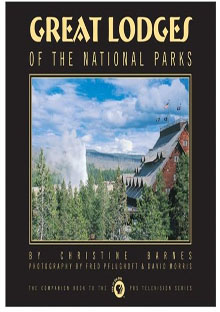
Great Lodges of the National Parks
By Christine Barnes
I'm an indoorsy person who grew up in Montana alienated from nature. In my hometown, the outdoors was the domain of those who could climb higher, bike farther, ski faster, and camp out forever. But after I moved to New York City and got homesick for the West, I found myself drawn to our come-as-you-are national parks. I fell in love with the comforting, all-American beauty of the historic lodges pictured and described in this book. Having dinner at El Tovar after a sweaty day ogling the Grand Canyon, or reading a book in a rocking chair at the Old Faithful Inn after sulfurous hikes around Yellowstone—it's hard not to get swept up with an old-fashioned excitement about seeing the country. Also, turns out I have a thing for stuff made out of giant logs.
By Christine Barnes
I'm an indoorsy person who grew up in Montana alienated from nature. In my hometown, the outdoors was the domain of those who could climb higher, bike farther, ski faster, and camp out forever. But after I moved to New York City and got homesick for the West, I found myself drawn to our come-as-you-are national parks. I fell in love with the comforting, all-American beauty of the historic lodges pictured and described in this book. Having dinner at El Tovar after a sweaty day ogling the Grand Canyon, or reading a book in a rocking chair at the Old Faithful Inn after sulfurous hikes around Yellowstone—it's hard not to get swept up with an old-fashioned excitement about seeing the country. Also, turns out I have a thing for stuff made out of giant logs.
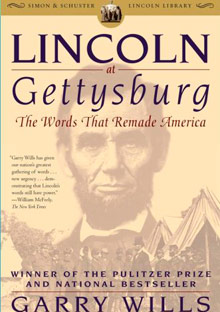
Lincoln at Gettysburg
By Garry Wills
Lingering over the Gettysburg Address, Wills fleshes out Abraham Lincoln as a thinker, artist, politician, orator, and commander in chief. Wills is at his most riveting when he examines how Lincoln summons the Declaration of Independence, written four score and seven years earlier, to call for a "new birth of freedom" for American slaves. "The 'great task remaining' at the end of the Address," writes Wills, "is not something inferior to the great deeds of the fathers. It is the same work, always being done...."
By Garry Wills
Lingering over the Gettysburg Address, Wills fleshes out Abraham Lincoln as a thinker, artist, politician, orator, and commander in chief. Wills is at his most riveting when he examines how Lincoln summons the Declaration of Independence, written four score and seven years earlier, to call for a "new birth of freedom" for American slaves. "The 'great task remaining' at the end of the Address," writes Wills, "is not something inferior to the great deeds of the fathers. It is the same work, always being done...."
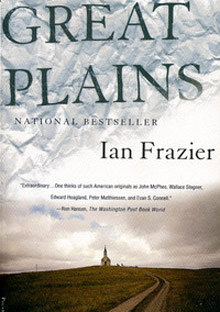
Great Plains
By Ian Frazier
Frazier's road trip through the country's vast and windy middle chunk—discussing Lewis and Clark, Bonnie and Clyde, Truman Capote, and Lawrence Welk—is all over the place. Here be cowboys and Indians, missile silos, a fossil museum, the tragedy of the Dust Bowl and the glory of Crazy Horse. Along his route, Frazier chats with gas station attendants, Sioux hitchhikers, and "a guy working in a wheat storage yard in Limon, Colorado." Frazier's gift is that he is capable of immense fascination. And it's so contagious he makes me want to put exclamation points after words I thought I didn't care about. Like, Nebraska!
By Ian Frazier
Frazier's road trip through the country's vast and windy middle chunk—discussing Lewis and Clark, Bonnie and Clyde, Truman Capote, and Lawrence Welk—is all over the place. Here be cowboys and Indians, missile silos, a fossil museum, the tragedy of the Dust Bowl and the glory of Crazy Horse. Along his route, Frazier chats with gas station attendants, Sioux hitchhikers, and "a guy working in a wheat storage yard in Limon, Colorado." Frazier's gift is that he is capable of immense fascination. And it's so contagious he makes me want to put exclamation points after words I thought I didn't care about. Like, Nebraska!
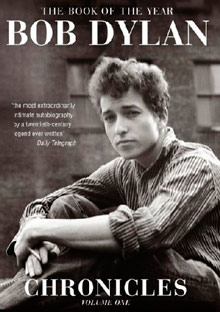
Chronicles, Volume One
By Bob Dylan
This memoir is obstinate, which is part of its charm. All the things a fan thinks she would want to read about—what it was like recording Blonde on Blonde, for instance—Dylan skips entirely. Instead he coughs up the sort of enchanting ephemera that adds up to a life of the mind, such as his youthful research into strange old songs about murder and disaster that led him to conclude that "folk songs are evasive." The revelation of the book, though, is Dylan's sweetness. If you mostly think of him as a cryptic songwriter or the sarcastic destroyer of journalists captured in the film Don't Look Back, there's something so endearing about the image he recounts here of the young Dylan hovering over a jukebox in Greenwich Village to listen to Judy Garland sing "The Man That Got Away" because it was like "listening to the girl next door."
By Bob Dylan
This memoir is obstinate, which is part of its charm. All the things a fan thinks she would want to read about—what it was like recording Blonde on Blonde, for instance—Dylan skips entirely. Instead he coughs up the sort of enchanting ephemera that adds up to a life of the mind, such as his youthful research into strange old songs about murder and disaster that led him to conclude that "folk songs are evasive." The revelation of the book, though, is Dylan's sweetness. If you mostly think of him as a cryptic songwriter or the sarcastic destroyer of journalists captured in the film Don't Look Back, there's something so endearing about the image he recounts here of the young Dylan hovering over a jukebox in Greenwich Village to listen to Judy Garland sing "The Man That Got Away" because it was like "listening to the girl next door."
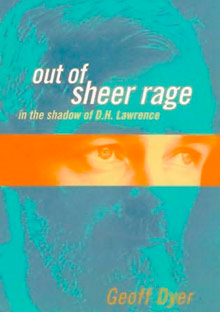
Out of Sheer Rage
By Geoff Dyer
This is a book about not being able to write a book about D.H. Lawrence. Dyer is frustrated and therefore hilarious. He procrastinates. He can't concentrate. He's indecisive about everything from where to live to what to pack. And he lays bare the embarrassing secret of authors. Namely, the amount of stupidity and paralysis and adolescent putting things off that goes into writing about even the most high-minded subjects. As a person who gets paid to pontificate about my nation's history and ideals (but only after walking back and forth to the crackers in my pajamas and/or watching reruns of Buffy the Vampire Slayer on cable), I find this book terribly funny and painfully true.
By Geoff Dyer
This is a book about not being able to write a book about D.H. Lawrence. Dyer is frustrated and therefore hilarious. He procrastinates. He can't concentrate. He's indecisive about everything from where to live to what to pack. And he lays bare the embarrassing secret of authors. Namely, the amount of stupidity and paralysis and adolescent putting things off that goes into writing about even the most high-minded subjects. As a person who gets paid to pontificate about my nation's history and ideals (but only after walking back and forth to the crackers in my pajamas and/or watching reruns of Buffy the Vampire Slayer on cable), I find this book terribly funny and painfully true.




